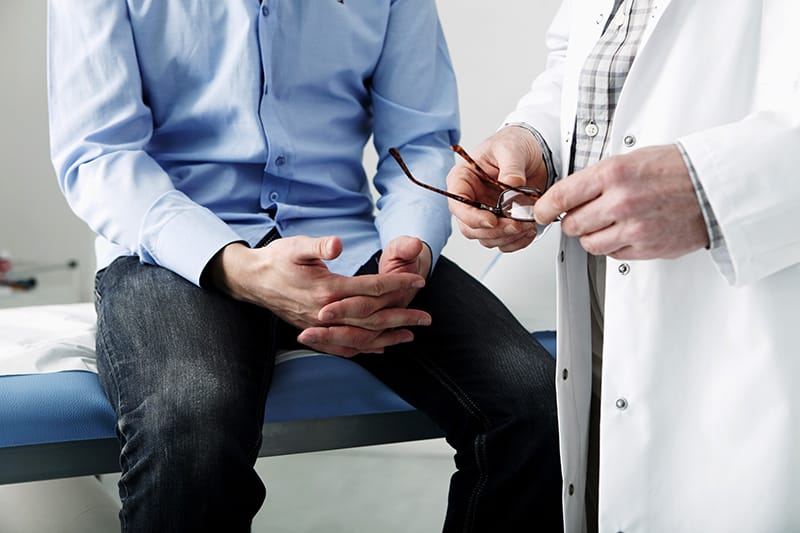For most men, the idea of a vasectomy brings anxiety. They’ve spent years protecting their private parts, so the thought of going under the knife down there makes them nervous.
The surgery itself is quick. Once you overcome the nerves surrounding the procedure, you’ll find that the recovery time is too.
 The average vasectomy recovery time is less than a week.
The average vasectomy recovery time is less than a week.
“Most people who do it one day can work the next day,” says Steven Rosenberg, MD, a urologist at The Iowa Clinic Men’s Center in West Des Moines. “Fridays are a popular day, with the idea that you’ll take it easy over the weekend and be ready to get back to work by Monday. It’s probably a week on average before you’re back to full activities.”
That’s a quick timeline. But vasectomy is still surgery. You have to give yourself time to heal to get all the way back to the way you were before.
“You’re doing most things really very quickly. But it could be as long as six weeks until you look down there and can’t tell that you’ve had anything done,” Dr. Rosenberg says.
If you follow your urologist’s orders, you’ll return to full activity — sexual and otherwise — in no time.
 Vasectomy Recovery Tips
Vasectomy Recovery Tips
Like with any surgery, the first few days post-vasectomy are the most important. This is the time where you’re still feeling the effects. Take it easy and follow these tips to heal up after your procedure:
- Get some rest. Keep your activity to a minimum for at least the first two days, then resume activities as much as you can tolerate them. Avoid doing anything strenuous, like heavy lifting.
- Kick your feet up. Relax in a recliner or lie down with your feet elevated. Elevation promotes circulation, which leads to healing.
- Ice your area. This is where the frozen peas come in. You want something cold that you can mold around your testicles — not a heavy, blocky ice pack that rests on top.
- Practice good hygiene. Wait until the day after your vasectomy to shower to give the wounds time to heal. After that, keep your groin area clean to prevent infection. But stick to the shower — stay out of the bath tub for three to four days.
- Wear comfortable clothing. Dr. Rosenberg says supportive or tight underwear like compression shorts are helpful for comfort the first couple of days after a vasectomy. As the area heals, loose-fitting clothing like sweatpants are best until you feel comfortable in tighter clothes again.
- Take acetaminophen or ibuprofen. You may have a little discomfort in the first 72 hours after vasectomy. Everybody’s pain tolerance is different, but most people get by with Tylenol or Advil until the discomfort goes away.
By day three, you’re on your way to healing and ready to handle nearly all normal activities. You still want to avoid exerting yourself too much, either in exercise or intercourse, until you hit the one week mark — to avoid complications. Rushing back to activities too soon and ignoring your physician’s instructions are the most common reasons men suffer setbacks.
 There are a few side effects of having a vasectomy, but serious issues are rare.
There are a few side effects of having a vasectomy, but serious issues are rare.
Men are less concerned about the procedure itself and much more about the effects of it. Things may not look right for weeks, but Dr. Rosenberg often assures patients that it’s a normal part of the healing process.
“There could be a little bruising and swelling, obviously. There could still be a few stitches dissolving,” he says. “You may get a little bit of drainage, a minimal amount of yellowish discharge.”
But the risk of pain, and especially chronic pain, is extremely low.
“It’s discomfort. It’s not stabbing pain or anything dramatic. Most people bounce really back quickly,” Dr. Rosenberg says. “Chronic pain after vasectomy is unbelievably rare. And there’s no proven relationship between vasectomy and any health problems like sexual desire, sexual performance, hormones, heart disease or prostate cancer.”
Most men who do experience complications after their vasectomy complain of bad bruising, which just takes time and rest until it gets better. Occasionally, the surgical sites get infected.
“It doesn’t happen very often. Obviously, it’s not the cleanest part of the body. It’s sweaty and confined,” Dr. Rosenberg says. “You have to keep it clean. If you don’t, there is a risk of infection and you may have to get some antibiotics.”
 Skipping your follow-up appointment after surgery is a huge risk.
Skipping your follow-up appointment after surgery is a huge risk.
Vasectomy is the simplest and single best form of permanent birth control. It’s more than 99% effective — as long as you get your sample checked.
“When you leave the office after vasectomy, you’re not sterile immediately,” Dr. Rosenberg says. “Once you have the procedure, you’re immediately trapping the sperm that are behind that point. But there are sperm up and down the vas deferens all of the time, and those beyond the vasectomy site on each side may still fertilize an egg.”
That’s why your return appointment at three months is critical. While you’re long past the point of feeling post-surgery symptoms, you need to make sure the vasectomy worked.
It’s not even an appointment, really. You simply drop off a semen sample in a container provided to you at the time of your procedure. The urologist will review your sample under a microscope to check for sperm. If none is detected, you can trust that the vasectomy worked and count on it as your only form of birth control.
“You should always keep using birth control until the sperm are gone. The idea is that if you wait three months, the healing’s done. If you’re good when your sample is checked, you can trust that it worked,” says Dr. Rosenberg.
There’s a remote risk of something called recanalization, which is likely what you’re hearing about in stories where a vasectomy “didn’t work.” The body naturally tries to heal itself. If the snipped segments of vas deferens fall too closely together and reform, the vasectomy doesn’t take. But it’s even more rare than other side effects.
“Rarely do people have to come back in. Most people just need reassurance that what they’re experiencing is normal,” Dr. Rosenberg says. “We encourage everybody to call the Urology department if you have any questions or concerns or if something doesn’t seem right.”


